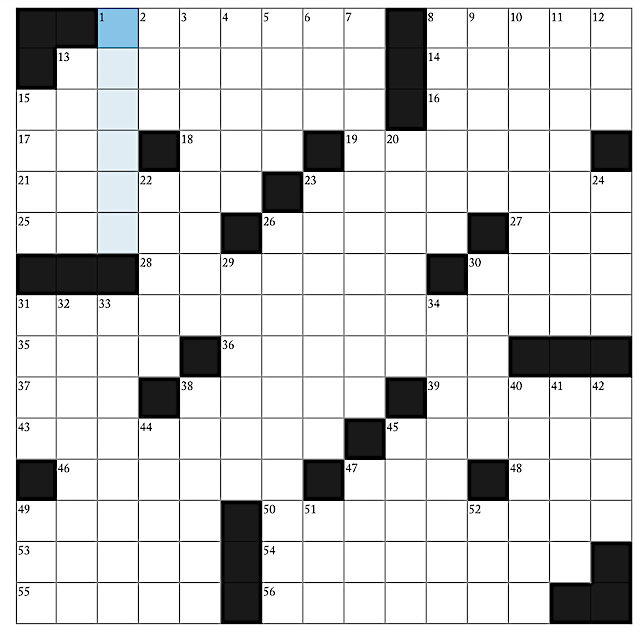
If you’ve ever done crosswords, you probably enjoy the wordplay (and new knowledge) in some of the clues (often denoted by an appended “?”) as much as solving the puzzle. So, for some recent examples from NYT/New Yorker puzzles:
• Small trunks? — SPEEDOS
• It doesn’t help much when it’s cold? — COMFORT
• Post codes? — ETIQUETTE
• Refrain from eating pasta? — UHOHSPAGHETTIOS (Too young to get it?)
• One way to get through a wall? — OSMOSIS
• Words said when one’s hand is shaky? — IMOUT
• Art class? — GENRE
• Begin, say? — ISRAELI
• Information for the record? — LINERNOTES
• Self-guided tour? — EGOTRIP
• Having digital display? — OPENTOED
• Remains to be seen? — RUIN
• Where you might get a word in edgewise? — SCRABBLE
• Things picked up and kicked? — HABITS
• A shoe presses against it? — BRAKEDRUM
• They’re acquired in some unions? — STEPSONS
• Efficiency option? — MURPHYBED
• Things usually held while facing backwards? — OARS
Soon enough, though, the puzzle is done. Will Shortz, the long-time NYT puzzle editor, says that, even in late-in-the-week puzzles (that are harder), there’s generally a limit to how many such ‘clever’ clues are considered reasonable in any one puzzle (the usual limit in 15×15 puzzles seems to be seven).
But you aren’t constrained by any such limit! What I’ve started to do, to supplement my puzzle enjoyment, is to pick five prosaic words with straightforward clues from each puzzle I do, and come up with clever (well, cleverer) or more interesting clues that could have been used instead. I pick the most ordinary words because you’re really limited in wordplay options with more obscure and lengthy words. I avoid words that already have wordplay clues (Mr Shortz’s work is hard to top). And I don’t shy away from people and place names, since there can often be a great clue that draws on some little-known but fascinating fact about that person or place.
Here are some examples from recent puzzles: First, the straightforward clue, then the ANSWER, and then my Alternative Clue:
- Foyer feature — COATRACK — Outerwearware?
- Warhol’s “Campbells’ Tomato Juice Box” eg — POPART — Paintings only a father could love?
- Asia’s ____ Sea — ARAL — Former great sea extinguished by botched attempt to create cotton fields
- Continuing story — SERIAL — Kind of killer or monogamy
- Anti-Communist fervor — REDSCARE — Slogan for compassionate conservatives?
- Stolas:Women : ___:Men — TOGAS — Wool clothes once forbidden to women
- Its capital is Whitehorse — YUKON — River with 2nd largest drainage area in North America
- Jump to conclusions — ASSUME — Take on, or for granted
- Lover boy — ROMEO — Alfa male?
- Leg presses work them — QUADS — Great muscles, courtyards or poker hands, for short
You get the idea. If you’re a cruciverbalist, it can increase the enjoyment of your daily puzzle time, and exercise some different mental muscles as well. Experts on Alzheimers are now suggesting that pastimes that engender new ideas and knowledge are better for keeping your brain from atrophying than those that merely test your powers of recall.




